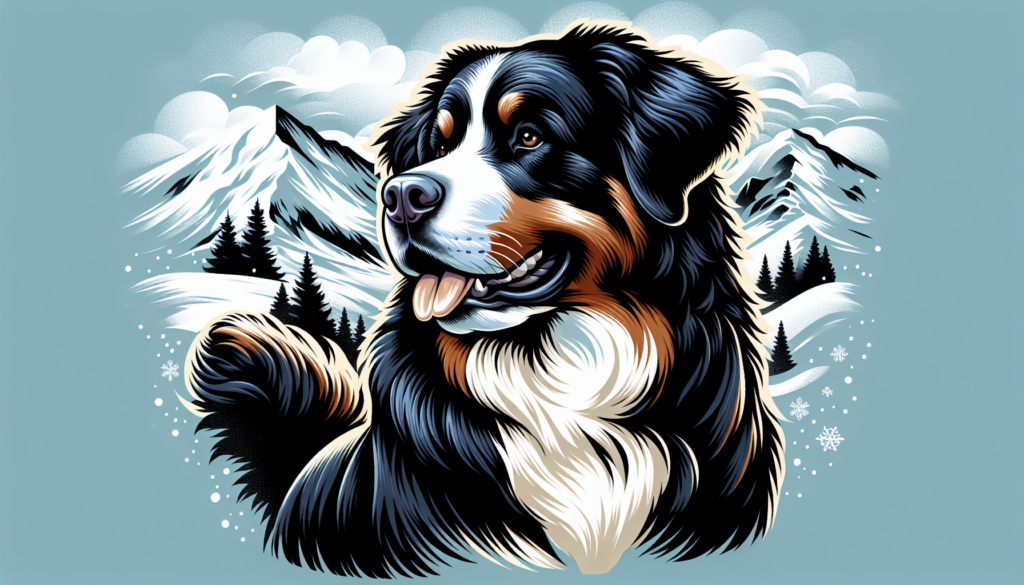If you’ve ever wondered about the purpose behind breeding Bernese Mountain Dogs, you’re in for a fascinating revelation. These majestic creatures were not just created for their adorable appearance and lovable temperament. No, they were bred with a specific purpose in mind, one that dates back centuries. From their incredible strength and endurance to their innate herding and guarding abilities, the Bernese Mountain Dogs have been carefully crafted to serve as invaluable working companions, epitomizing loyalty, devotion, and unwavering commitment.
History of Bernese Mountain Dogs
The Bernese Mountain Dog, also known as the Berner Sennenhund, is an ancient breed whose history can be traced back to the Swiss Alps. These magnificent dogs were originally bred to work on farms in the Canton of Bern, Switzerland, where they served as versatile working dogs. The exact origins of the breed are unknown, but it is believed that Bernese Mountain Dogs are descendants of the Roman Molossus dogs, brought to Switzerland by the Roman army over 2,000 years ago.
Origin of Bernese Mountain Dogs
As their name suggests, Bernese Mountain Dogs were primarily bred and used in the mountainous regions of Switzerland. The breed was developed to be an all-around farm dog, helping with various tasks such as herding, pulling carts, and guarding livestock. Their thick double coat enabled them to withstand the harsh Alpine climate, while their strong build and powerful legs made them capable of navigating the rugged terrain.

Characteristics of Bernese Mountain Dogs
Bernese Mountain Dogs are easily recognizable by their distinctive markings: a black coat with symmetrical white and rust-colored markings on their chest, face, and legs. They have a sturdy and muscular body, with a broad head and intelligent, expressive eyes. These dogs are known for their calm and friendly temperament, making them excellent companions and family pets.
Working Purpose of Bernese Mountain Dogs
Drafting and Pulling Sleds
One of the main purposes for which Bernese Mountain Dogs were bred was as draft dogs. Their strong build and natural endurance made them well-suited for pulling heavy loads. In the past, these magnificent dogs were often utilized to transport goods, such as milk or other agricultural products, from the farms to the market. Their ability to pull sleds and carts was invaluable, especially in the snowy winter months when the mountainous terrain became even more challenging.
Herding Livestock
Bernese Mountain Dogs were also bred to assist in herding livestock. Their innate herding instincts, coupled with their gentle yet authoritative nature, made them excellent herding dogs. On the Swiss farms, these dogs were responsible for keeping the herds of cattle, sheep, and goats in line and ensuring their safe passage from one pasture to another. Their large size and powerful presence effectively deterred any potential threats to the livestock.
Guarding Property and Family
In addition to their roles as draft and herding dogs, Bernese Mountain Dogs were also valued as guardians of property and family. Their innate loyalty and protective nature made them exceptional watchdogs. These dogs were entrusted with the important task of protecting their owners’ homes and loved ones from any potential danger. The Berner’s imposing stature and deep bark served as a deterrent to intruders, while their gentle and affectionate demeanor made them beloved family companions.

Companion Purpose of Bernese Mountain Dogs
Family Pets
While Bernese Mountain Dogs were initially bred as working dogs, they have also found a special place in the hearts of families worldwide as beloved pets. The breed’s gentle and friendly nature, combined with their loyalty and devotion, make them excellent companions for people of all ages. Berners thrive on affection and are known for forming deep bonds with their human family members. They are patient and gentle with children and can adapt well to different living situations, making them a popular choice for families.
Therapy and Emotional Support Dogs
Bernese Mountain Dogs also excel in roles beyond companionship, such as therapy and emotional support dogs. Due to their calm and gentle temperament, they have the ability to provide comfort and emotional support to individuals in need. Whether it’s in hospitals, nursing homes, or schools, Bernese Mountain Dogs have a natural ability to bring joy and alleviate stress. Their presence alone can make a significant positive impact on the emotional well-being of others.
Show Purpose of Bernese Mountain Dogs
Conformation Exhibitions
Another purpose for which Bernese Mountain Dogs are bred is to participate in conformation exhibitions. These events evaluate the dog’s adherence to breed standards and their physical attributes. Berners are judged based on their adherence to the breed’s standard, which includes factors such as size, structure, coat color, and markings. Conformation shows provide an opportunity for breeders to showcase their dogs and contribute to the preservation and improvement of the breed.
Performance Events
In addition to conformation shows, Bernese Mountain Dogs can also participate in various performance events. These events test the dog’s skills and abilities, including obedience, agility, and tracking. Berners are intelligent and eager to please, making them highly trainable and successful competitors in performance events. Whether it’s navigating an obstacle course or demonstrating their obedience, Bernese Mountain Dogs have the potential to excel in various performance activities, showcasing their versatility and athleticism.
Health Testing and Breeding Goals
Importance of Health Testing
Responsible breeders of Bernese Mountain Dogs place a strong emphasis on health testing to ensure the overall well-being of the breed. Berners are prone to certain genetic health issues, such as hip and elbow dysplasia, as well as certain types of cancer. Health testing, including X-rays and genetic screenings, helps identify potential health concerns and allows breeders to make informed breeding decisions. By prioritizing health testing, breeders can work towards significantly reducing the incidence of these health issues within the breed.
Breeding for Temperament and Disposition
In addition to physical health, it is equally important for breeders to consider the temperament and disposition of Bernese Mountain Dogs. The breed is known for its calm and friendly nature, and responsible breeders strive to preserve these desirable traits. By selecting breeding pairs with excellent temperaments and disposition, breeders can help ensure that future generations of Berners continue to possess the gentle, patient, and loving nature that makes them such wonderful family companions.
Maintaining Breed Standards
Maintaining breed standards is a vital aspect of Bernese Mountain Dog breeding. The breed standards are established guidelines that describe the physical characteristics, temperament, and overall appearance of Berners. By carefully selecting breeding pairs that closely adhere to these standards, breeders can contribute to the preservation and improvement of the breed. The goal is to produce Bernese Mountain Dogs that not only exemplify the breed’s standard but also possess the qualities that make them exceptional working dogs, companions, and show dogs.
Ethical Considerations in Bernese Mountain Dog Breeding
Responsibility of Breeders
Ethical breeders of Bernese Mountain Dogs understand the responsibility that comes with bringing new lives into the world. They prioritize the health and well-being of their breeding dogs and ensure they receive proper veterinary care, nutrition, and socialization. Responsible breeders carefully plan each breeding with the goal of producing healthy and well-tempered puppies, never compromising the welfare of the dogs in their care. They also advocate for responsible dog ownership and remain a resource and support system for puppy buyers throughout the dog’s lifetime.
Avoiding Harmful Practices
Ethical breeders are committed to avoiding harmful practices that can jeopardize the health and well-being of Bernese Mountain Dogs. This includes avoiding excessive inbreeding, which can lead to a higher risk of inherited diseases and health issues. Responsible breeders also refrain from producing puppies solely for profit, instead prioritizing the welfare of the breed and ensuring that each puppy goes to a suitable and loving home. Furthermore, ethical breeders educate themselves and stay updated with the latest advancements in veterinary care and breeding practices.
Ensuring Suitable Homes for Puppies
An essential aspect of ethical breeding is ensuring that each puppy goes to a suitable home. Responsible breeders carefully screen potential puppy buyers to ensure they can provide a loving and nurturing environment for the dog. They take the time to educate new owners about the specific needs and care requirements of Bernese Mountain Dogs, as well as the lifelong commitment involved in owning a dog. By placing puppies in suitable homes, ethical breeders contribute to the overall well-being and happiness of the breed.
Popularity and Demand for Bernese Mountain Dogs
Trends in Breed Popularity
The Bernese Mountain Dog has experienced a surge in popularity over the years, with an increasing number of families choosing them as their preferred breed. Their gentle and friendly nature, coupled with their striking appearance, has endeared them to dog lovers around the world. However, with increasing popularity comes the risk of irresponsible breeding and a lack of responsible ownership. It is crucial for prospective owners to thoroughly research the breed, consider their own lifestyle and ability to meet the dog’s needs, and seek out reputable breeders who prioritize the welfare of the breed.
Demand for Puppies
As the popularity of Bernese Mountain Dogs continues to grow, the demand for puppies has also increased. Many people are drawn to the breed’s striking appearance and the perceived image of Berners as gentle and loving companions. However, it is essential for potential owners to understand that Bernese Mountain Dogs require a significant commitment in terms of time, effort, and resources. Responsible breeders carefully assess each potential owner to ensure they are aware of the breed’s needs and can provide a suitable home for a Berner.
Supply and Responsible Breeding
With the growing demand for Bernese Mountain Dogs, it is crucial to emphasize the importance of responsible breeding practices. Reputable breeders prioritize the health and well-being of their breeding dogs and the puppies they produce. They carefully plan each breeding and ensure that both the dam and sire have undergone health testing to minimize the risk of inherited diseases. Responsible breeders strive to improve the breed with each generation and aim to produce puppies that exemplify the breed’s standard while possessing the desired temperament and disposition.
Potential Challenges in Breeding Bernese Mountain Dogs
Genetic Health Issues
One of the significant challenges in breeding Bernese Mountain Dogs is the presence of genetic health issues within the breed. These dogs are susceptible to conditions such as hip and elbow dysplasia, certain types of cancer, and von Willebrand’s disease. Responsible breeders actively work to reduce the occurrence of these health issues by implementing health testing and carefully selecting breeding pairs. However, the presence of these genetic health issues necessitates ongoing research and vigilance to ensure the breed’s long-term well-being.
Sensitive Breeding Process
Breeding Bernese Mountain Dogs can be a complex and sensitive process. Female Berners typically have relatively small litter sizes, and careful attention must be paid to ensure the health of both the mother and puppies. Breeding should be done responsibly, with careful consideration given to factors such as the health, temperament, and conformation of the potential parents. The sensitive nature of the breeding process requires breeders to have a deep understanding of the breed and to seek guidance and support from experienced mentors within the Bernese Mountain Dog community.
Reputability of Breeders
Another challenge in breeding Bernese Mountain Dogs is the presence of disreputable breeders who prioritize profit over the welfare of the dogs. These breeders may cut corners when it comes to health testing or fail to properly socialize and care for their puppies. It is crucial for prospective owners to thoroughly research breeders, ask for references, and ensure that they are working with someone who is committed to responsible breeding practices. By supporting reputable breeders, individuals can contribute to the overall health and well-being of the breed.
Future Considerations for Breeding Bernese Mountain Dogs
Continuing to Improve Health
The ongoing challenge for breeders of Bernese Mountain Dogs is to continue improving the overall health of the breed. By prioritizing health testing, actively participating in research studies, and selectively breeding dogs with excellent health records, breeders can make significant progress in reducing the occurrence of genetic health issues. The collaboration of breeders, veterinarians, and researchers is essential to ensure that the breed’s future generations are healthier and more resilient.
Sustainable Breeding Practices
Sustainability is a crucial consideration for breeders to safeguard the long-term viability of the Bernese Mountain Dog breed. Responsible breeders prioritize genetic diversity, as excessive inbreeding can lead to a higher risk of inherited diseases. By carefully planning each breeding and seeking out diverse bloodlines, breeders can help maintain a healthy and genetically robust Bernese Mountain Dog population. Additionally, responsible breeders actively engage in breed preservation efforts, contributing to the breed’s longevity and vitality.
Promoting Responsible Ownership
In addition to responsible breeding, promoting responsible ownership is essential for the future of Bernese Mountain Dogs. Potential owners must understand the breed’s needs and be genuinely committed to providing appropriate care throughout the dog’s life. Breeders play a vital role in educating new owners about the breed’s characteristics, temperament, and care requirements. By fostering a strong bond with puppy buyers and remaining a resource throughout the dog’s lifetime, breeders can contribute to a culture of responsible ownership and enhance the overall well-being of Bernese Mountain Dogs.
Conclusion
The history of Bernese Mountain Dogs is rooted in their ancestral role as versatile working dogs in the Swiss Alps. Today, this magnificent breed continues to excel in various purposes, such as drafting, herding, and guarding, while also being cherished as family pets and show dogs. Responsible breeding practices and the preservation of breed standards are key considerations for breeders, ensuring the health, temperament, and overall well-being of Bernese Mountain Dogs. As the popularity of this breed increases, it is crucial for individuals to support reputable breeders who prioritize the welfare of the dogs and promote responsible ownership. With a collective commitment to the breed’s health, sustainability, and responsible ownership, the future of Bernese Mountain Dogs looks bright.
